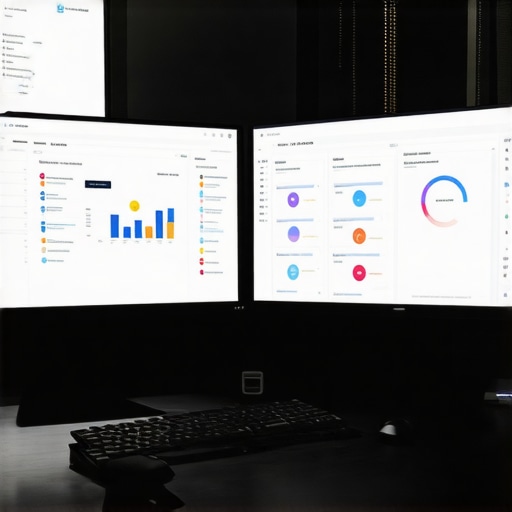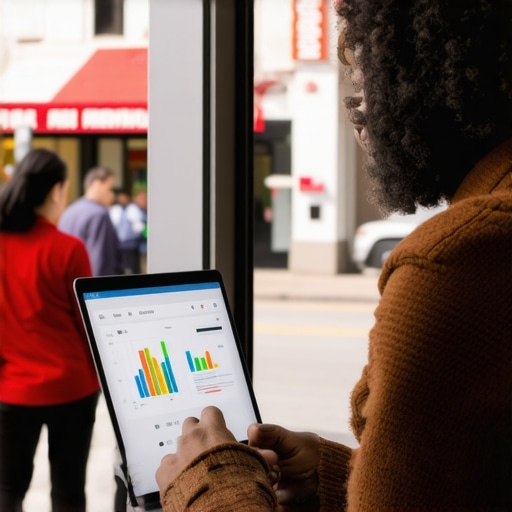Understanding the Nexus Between Customer Reviews and Local SEO: A Strategic Perspective
In the competitive landscape of local business marketing, customer reviews have transcended their traditional role as mere feedback mechanisms to become pivotal components of sophisticated SEO strategies. As digital marketing professionals and local SEO experts recognize, reviews influence search engine algorithms in nuanced ways, affecting visibility, credibility, and ultimately, revenue streams.
Decoding the Algorithmic Significance of Customer Feedback in Local Search Rankings
Google’s local search algorithm integrates review signals as key ranking factors, emphasizing review quantity, quality, and recency. According to Moz’s Local Search Ranking Factors report, reviews contribute significantly to local pack rankings, impacting a business’s proximity and prominence on Google Maps and organic search results. The semantic value embedded within reviews, such as keywords and service descriptions, further enhances relevance, demonstrating the importance of strategic review management.
Expert Strategies for Leveraging Reviews to Maximize SEO Outcomes
How can businesses systematically harness customer reviews to reinforce their SEO authority?
Implementing a structured review generation and management protocol is essential. This involves proactive outreach to satisfied customers, utilizing review funnels, and integrating review collection into post-service touchpoints. Moreover, optimizing review responses with relevant keywords and detailed insights can amplify keyword relevance without risking over-optimization. For instance, incorporating location-specific terms and service descriptors in responses enhances local relevance, aligning with Google’s focus on contextual signals.
Why Do Review Authenticity and Diversity Matter for Search Performance?
Authentic, diverse reviews not only foster trust among potential customers but also signal genuine engagement to search engines. A varied review profile—covering multiple services, locations, and customer demographics—serves as a rich semantic dataset, bolstering both local relevance and authority. High review volume combined with positive sentiment correlates with higher rankings, as supported by academic research in consumer behavior and trustworthiness metrics.
Open Question: How Do Emerging AI and Review Analysis Tools Transform the Review-SEO Paradigm?
Emerging AI-powered sentiment analysis and review monitoring tools facilitate real-time insights, enabling businesses to adapt their local SEO tactics dynamically. These technologies can identify review patterns, detect potential reputation issues, and suggest optimization strategies—significantly elevating review management from reactive to predictive. For comprehensive guidance on integrating advanced tools into your SEO workflow, consult our Local SEO Optimization Techniques.
To deepen your expertise, explore our detailed guide on GMB SEO Audit and consider contributing your insights or questions to our community of SEO professionals. By doing so, you not only refine your strategy but also participate in shaping best practices for local search dominance.
Harnessing the Power of Review Insights for Local SEO Domination
While managing review quantity and recency is fundamental, savvy businesses are now delving into the qualitative aspects of reviews to extract nuanced insights. Analyzing sentiment, recurring keywords, and service-specific feedback allows for a more targeted approach to local SEO. For example, if multiple reviews highlight “quick response” or “expert craftsmanship,” these terms can be strategically incorporated into your website content, service descriptions, and Google My Business updates to reinforce relevance and authority.
How Can Businesses Use AI to Elevate Review-Based SEO Tactics?
Emerging AI and machine learning tools are transforming review analysis from manual sentiment checks to real-time, predictive insights. Advanced platforms can detect shifts in customer perception, identify emerging service trends, and flag reputation risks before they escalate. Integrating these insights into your SEO strategy ensures that your content, keywords, and engagement efforts stay aligned with current customer sentiment. For a comprehensive approach, consider leveraging tools like local SEO tools that incorporate AI-driven review analysis features.
What are the ethical considerations and best practices for using review data to influence SEO content?
Transparency and authenticity are paramount. While it’s tempting to optimize content heavily with keywords derived from reviews, over-optimization can backfire, risking penalties or diminished trust. Best practices include ensuring that review-inspired content remains genuine, accurately reflects customer experiences, and avoids manipulation. Additionally, businesses should respect privacy and data protection regulations, especially when analyzing reviews that may contain personal information. For detailed guidance, visit privacy policies and ethical SEO standards.
If you found these insights valuable, share your thoughts or questions below, or explore our comprehensive local SEO techniques to refine your overall strategy.
Harnessing the Nuanced Power of Customer Reviews for Cutting-Edge Local SEO Strategies
In the rapidly evolving landscape of local search optimization, understanding the intricate relationship between customer reviews and search engine algorithms is crucial for staying ahead. Beyond the basic metrics of review volume and star ratings, there exists a wealth of sophisticated data points—such as semantic keywords, sentiment nuances, and temporal patterns—that can be harnessed to craft a highly targeted SEO approach. This requires a blend of technical proficiency, data analysis acumen, and strategic foresight.
Deciphering Semantic Richness in Customer Feedback for Hyper-Localized SEO
Semantic analysis of reviews enables businesses to identify contextually relevant keywords embedded naturally within customer language. For instance, reviews mentioning “quick response” or “professional installation” can be transformed into targeted keywords, enriching website content, meta descriptions, and GMB posts. Advanced natural language processing (NLP) tools, like Google’s BERT-based models, facilitate this semantic extraction, helping to align content with the evolving search intent landscape.

How Can AI-Driven Sentiment Analysis Elevate Your Review Strategy?
AI-powered sentiment analysis tools go beyond simple positive/negative classifications, offering granular insights into customer perceptions. These tools can detect shifts in sentiment related to specific services, staff, or products, allowing for proactive reputation management. Moreover, integrating sentiment trends with local SEO efforts ensures that content updates, review response strategies, and keyword optimization are synchronized with real-time customer perceptions. For example, a spike in negative sentiment about delivery times can trigger targeted content adjustments highlighting your logistical improvements.
What Are the Ethical and Practical Limits of Using Review Data for SEO Enhancement?
While leveraging review insights offers substantial benefits, ethical considerations must govern your approach. Over-manipulation or artificial inflation of review-derived keywords can risk penalties from search engines and damage your brand’s credibility. Transparency remains paramount—use review data to inform genuine content improvements, not to mislead or manipulate. Also, respecting privacy laws such as GDPR and CCPA when analyzing review content—especially if they contain personal identifiers—is non-negotiable. For a comprehensive understanding, consult the latest guidelines from the Google Search Central.
To deepen your expertise, explore our detailed guide on Advanced Local SEO Techniques that integrate review analytics and AI tools, transforming raw data into actionable insights. Engage with our community by sharing your experiences or posing questions—collaborative learning accelerates mastery.
Integrating Review-Driven Content with Multi-Channel SEO Campaigns
Effective local SEO in 2024 demands a multi-channel approach, where review insights inform not only your Google My Business profile but also your website, social media, and email marketing. For instance, highlighting customer testimonials that mention specific keywords or services can bolster your content marketing efforts, improve keyword relevance, and enhance user engagement. Developing case studies or success stories based on review themes can also foster trust and authority.
As you refine your review management strategy, consider the potential of AI chatbots and review monitoring platforms—tools that can automate review collection, sentiment tracking, and competitor benchmarking. These technologies enable a dynamic, data-driven approach that keeps your local SEO strategy agile and aligned with customer expectations.
Harnessing Semantic Depth in Customer Feedback for Hyper-Localized SEO Mastery
Delving into semantic analysis of customer reviews unlocks nuanced keyword opportunities that mirror authentic search intent. Utilizing cutting-edge NLP models like Google’s BERT, businesses can extract contextually rich phrases such as “rapid response” or “expert craftsmanship,” transforming these insights into targeted keywords for website content, meta tags, and Google My Business updates. This sophisticated approach ensures your local SEO efforts resonate deeply with the evolving linguistic landscape of your customer base, positioning your business at the forefront of local search results.
Can AI-Driven Sentiment Trends Predict Future Customer Behavior?
Yes, advanced AI sentiment analysis tools extend beyond real-time feedback; they forecast emerging customer perceptions and service trends. By identifying subtle shifts in sentiment—such as increasing praise for delivery logistics or growing concerns about product durability—businesses can proactively refine their offerings and communication strategies. Integrating these predictive insights into content planning and review response protocols not only enhances reputation management but also fortifies your position in local search rankings, creating a dynamic, feedback-informed SEO ecosystem.
What Ethical Boundaries Govern the Use of Review Data in SEO Optimization?
Maintaining transparency and integrity is paramount when leveraging review insights for SEO. Ethical practices entail refraining from artificially manipulating review content or over-optimizing based on extracted keywords, as such tactics risk search engine penalties and erode consumer trust. Respecting privacy laws, such as GDPR and CCPA, is essential—especially when analyzing reviews containing personal data. Genuine, customer-centric content derived from authentic feedback ensures sustainable SEO success and long-term brand credibility, as emphasized by authoritative guidelines from Google Search Central.
For those committed to elevating their local search strategies ethically and effectively, continuous education on evolving SEO norms and review management best practices is vital. Engage with industry-leading resources and participate in professional communities to stay ahead of the curve.
Integrating Multi-Channel Review Insights for Cohesive Local SEO Campaigns
Beyond Google My Business, insights from customer reviews can inform a cohesive multi-channel marketing strategy. Repurposing positive testimonials into social media content, email campaigns, and website case studies amplifies your message’s reach and reinforces keyword relevance. Utilizing AI-powered review monitoring platforms enables real-time content adjustments and competitor benchmarking, ensuring your local SEO remains agile amidst changing customer perceptions and market dynamics. This holistic approach fosters trust, authority, and visibility across digital touchpoints, elevating your brand’s local dominance.

Expert Insights & Advanced Considerations
1. Integrate Semantic Analysis for Hyper-Localized Keyword Optimization
Utilize sophisticated NLP tools like Google’s BERT models to extract contextually relevant keywords from customer reviews, enabling highly targeted content strategies that resonate with local search intent.
2. Leverage AI-Driven Sentiment Trends for Predictive SEO Adjustments
Implement AI sentiment analysis platforms to monitor shifts in customer perception, allowing proactive optimization of website content, service offerings, and review responses tailored to emerging trends.
3. Prioritize Authenticity and Diversity in Review Profiles
Foster a varied review ecosystem across services, locations, and customer demographics to signal genuine engagement, enhancing local relevance and search engine trustworthiness.
4. Employ Multi-Channel Review Content Repurposing
Transform positive reviews into compelling social media posts, email campaigns, and case studies, amplifying authority and reinforcing keyword relevance across digital touchpoints.
5. Embrace Ethical Data Usage and Privacy Compliance
Ensure transparency in review data utilization, adhere to GDPR and CCPA regulations, and avoid manipulative tactics to maintain long-term credibility and search engine compliance.
Curated Expert Resources
- Google’s BERT NLP Models: Advanced natural language understanding tools for semantic keyword extraction.
- SEMrush and Ahrefs: Industry-leading platforms offering review monitoring, keyword insights, and competitive analysis.
- Google Search Central: Official guidelines on ethical SEO practices and review data handling.
- Google’s BERT and Natural Language Processing Resources: Deep dives into semantic analysis techniques for local SEO.
Final Expert Perspective
In the realm of local SEO, mastering customer review strategies means harnessing the power of semantic depth, predictive sentiment analysis, and ethical data practices. This comprehensive approach not only elevates search rankings but also builds authentic brand trust, positioning your business for sustained success. For those committed to pushing boundaries, engaging with advanced tools and industry resources is essential. Explore our comprehensive local SEO techniques and share your insights or questions—collaborative expertise accelerates mastery in this dynamic landscape.



